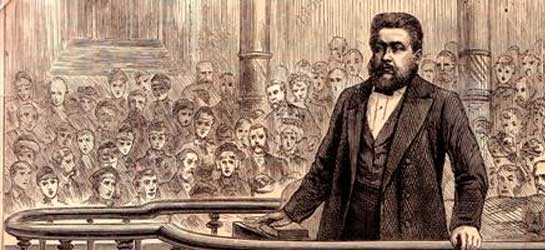
Paul commanded young Timothy to “do the work of an evangelist.” Every gospel ministry ever since has labored under the shadow of such an awesome command.
Perhaps no minister has done so with as much visible success as The Prince of Preachers. Charles Spurgeon delighted in soul-winning, his 19th century phrase for “evangelism.” In one lecture to his pastoral college students he said, “Our main business, brethren, is to win souls . . . so we must know about souls, and how to win them for God.”
The lecture proceeds to outline seven “Qualifications for Soul-Winning Godward”; in other words, which qualifications would God naturally look for in His servants, which qualifications He would be likely to approve, and most likely to use. Let me repackage them here with choice comments from The Prince in the hopes they will stir your soul for successful soul-winning.
7 GODWARD QUALITIES FOR SOUL-WINNING
#1: A man who is to be a soul-winner must have holiness of character. No wise man would pour his wine into foul bottles; no kind and good parent would allow his children to go to see an immoral play; and God will not go to work with instruments which would compromise His own character. In God’s school, the teachers must be masters of the art of holiness.
Dear brethren, I do beg you to attach the highest importance to your own personal holiness. Do live unto God. If you do not, your Lord will not be with you; He will say of you as He said of the false prophets of old, “I sent them not, nor commanded them: therefore they shall not profit this people at all, saith the Lord.” You may preach very fine sermons, but if you are not yourselves holy, there will be no souls saved.
#2: He must have spiritual life to a high degree. You see, brethren, our work is, under God, to communicate life to others. Life must be communicated by a living instrument, and the man who is to communicate the life must have a great deal of it himself. You remember the words of Christ, “He that believeth on Me, as the Scripture hath said, out of his belly shall flow rivers of living water,” that is, the Holy Spirit, when He dwells within a living child of God, afterwards rises out of the very midst of him as a fountain or a river, so that others may come and participate in the Spirit’s gracious influences.
#3: He must have a humble spirit. Certainly, the great God has a predilection for those who are humble. He loathes the proud; and whenever He sees the high and mighty, He passes them by; but whenever He finds the lowly in heart, He takes pleasure in exalting them. He delights especially in humility amongst His ministers.
In the matter of soul-winning, humility makes you feel that you are nothing and nobody, and that, if God gives you success in the work, you will be driven to ascribe to Him all the glory, for none of the credit of it could properly belong to you. If you do not have success, humility will lead you to blame your own folly and weakness, not God’s sovereignty. Why should God give blessing, and then let you run away with the glory of it? The glory of the salvation of souls belongs to Him, and to Him alone.
#4: He must have a living faith. If you have genuine faith in your call to the ministry, you will be ready, with Luther, to preach the gospel even while standing within the jaws of the leviathan, between his great teeth. You may depend upon it that souls are not saved by a minister who doubts; and the preaching of your doubts and your questions can never possibly decide a soul for Christ. You must have great faith in the Word of God if you are to be winners of souls to those who hear it.
That is the essential point, you must believe in God and in His gospel if you are to be a winner of souls; some other things may be omitted, but this matter of faith must never be.
#5: He must be characterized by thorough earnestness. The Lord Jesus Christ wept over Jerusalem, and you will have to weep over sinners if they are to be saved through you. Dear brethren, do be earnest, put your whole soul into the work, or else give it up.
#6: He must have a great simplicity of heart. By simplicity of heart, I mean, that a man evidently goes into the ministry for the glory of God and the winning of souls, and nothing else. There are some men who would like to win souls and glorify God if it could be done with due regard to their own interests. If a man seeks to serve himself, to get honour to himself, instead of seeking to serve God and honour Him alone, the Lord Jehovah will not use that man.
#7: He must be completely surrendered to God. I mean surrender in this sense, that from this time you wish to think, not your own thoughts, but God’s thoughts; and that you determine to preach, not anything of your own invention, but God’s Word; and further, that you resolve not even to give out that truth in your own way, but in God’s way.
I am sure this self-surrender is one of the essential qualifications for a preacher who is to be a winner of souls. There is a something that must be said if you are to be the means of saving that man in the corner; woe unto you if you are not ready to say it, woe unto you if you are afraid to say it, woe unto you if you are ashamed to say it, woe unto you if you do not dare to say it lest somebody up in the gallery should say that you were too earnest, too enthusiastic, too zealous!










